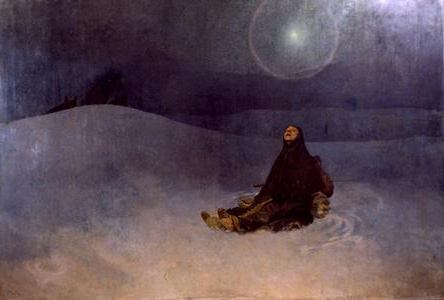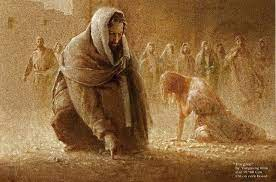A question I received:
Pearl,
Can you please tell me what Jesus was writing, when he bent down to the ground at John 8:3-9?
- - - - - - -
My Reply:
The first thing that the context reveals to us, is that this situation arose because the religious leaders wanted to entrap Jesus, by putting his teaching to the test (John8:3,6). Take note that the first thing he did in response to that challenge, was to start writing on the ground (John8:6).
Regarding such challenges to entrap him; Matt.22:18 reveals that those who do this, are hypocrites with evil intent.
Mark7:6 shows us more about the nature of such hypocrites. Though they teach some Bible truths, they do not live them (Matt.23:3).
Having hearts "far removed from" God; we see from this situation with the adulteress, that their inclination is to condemn, and not to forgive. What is God's judgment for such hypocrites? (John8:7)
Matt.6:15 explains.
What is the destiny of those whose sins are not forgiven by God?
Job 7:21 NLT tells us that they descend into the dust, and cease to exist.
Next comes a very helpful scripture, for our answer to your question.
Jer.17:13
Lord, you are the hope of Israel;
all who forsake you will be put to shame.
Those who turn away from you will be written in the dust
because they have forsaken the Lord,
the spring of living water."
Writing a name down, establishes God's judgment of condemnation or favor
(Deut.29:20; Mal.3:16; Dan.12:1; Luke10:20; Heb.12:23; Rev.2:17; 13:8; 17:8; 20:15; 21:27).
Jesus was testifying to those who sought to condemn and murder the adulteress (Matt.9:13; 6:15),
Pearl,
Can you please tell me what Jesus was writing, when he bent down to the ground at John 8:3-9?
- - - - - - -
My Reply:
The first thing that the context reveals to us, is that this situation arose because the religious leaders wanted to entrap Jesus, by putting his teaching to the test (John8:3,6). Take note that the first thing he did in response to that challenge, was to start writing on the ground (John8:6).
Regarding such challenges to entrap him; Matt.22:18 reveals that those who do this, are hypocrites with evil intent.
Mark7:6 shows us more about the nature of such hypocrites. Though they teach some Bible truths, they do not live them (Matt.23:3).
Having hearts "far removed from" God; we see from this situation with the adulteress, that their inclination is to condemn, and not to forgive. What is God's judgment for such hypocrites? (John8:7)
Matt.6:15 explains.
What is the destiny of those whose sins are not forgiven by God?
Job 7:21 NLT tells us that they descend into the dust, and cease to exist.
Next comes a very helpful scripture, for our answer to your question.
Jer.17:13
Lord, you are the hope of Israel;
all who forsake you will be put to shame.
Those who turn away from you will be written in the dust
because they have forsaken the Lord,
the spring of living water."
These leaders who sought to entrap the Son of God, were forsaking the Lord. He sent them His only son... the source of living water (John4:10,13-14; 1:9-12,14,29,31,34; Matt.15:24).
The result to those who reject and murder the chief agent of life?
(See Acts 3:13-15; John3:18)
Ec.9:5 reads;
"For the living know that they will die,
but the dead know nothing;
they have no further reward,
and even their name is forgotten."
but the dead know nothing;
they have no further reward,
and even their name is forgotten."
As Job 7:21 NLT had stated, "For I shall soon lie down in the dust;
you will search for me, but I shall be no more."
you will search for me, but I shall be no more."
As those who are not forgiven; Ps.109:15 applies...
"May their sins always remain before the Lord,
that he may blot out their name from the earth."
that he may blot out their name from the earth."
What was Jesus writing in the dust?
Writing a name down, establishes God's judgment of condemnation or favor
(Deut.29:20; Mal.3:16; Dan.12:1; Luke10:20; Heb.12:23; Rev.2:17; 13:8; 17:8; 20:15; 21:27).
Jesus was testifying to those who sought to condemn and murder the adulteress (Matt.9:13; 6:15),
that their wicked and hypocritical scheme, brought condemnation upon they themselves (Matt.7:2).
Indeed, they were hypocrites (John8:7).
For they themselves were guilty of being spiritual adulteresses...
(Isa.1:1,21; Jer.23:10-12; Matt.23:33-34,35-36,37-38)
...while condemning others to death.
Indeed, they were hypocrites (John8:7).
For they themselves were guilty of being spiritual adulteresses...
(Isa.1:1,21; Jer.23:10-12; Matt.23:33-34,35-36,37-38)
...while condemning others to death.
"Those who turn away from you will be written in the dust because they have forsaken the Lord, the spring of living water." (Jer.17:13NIV)

